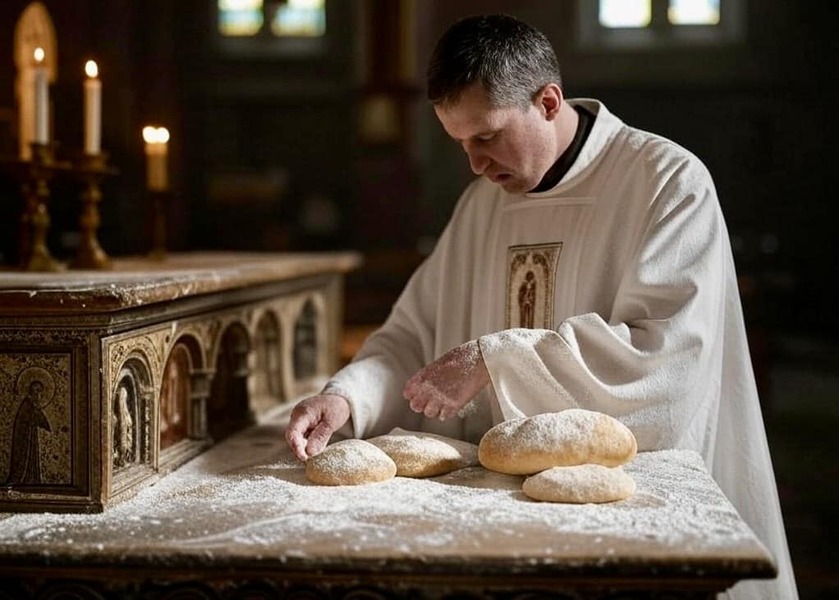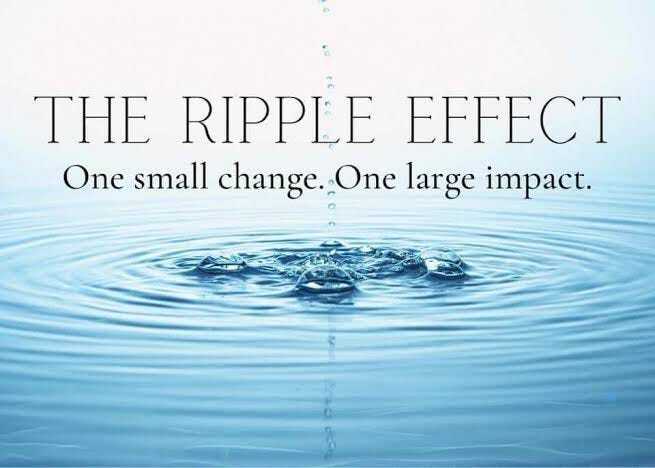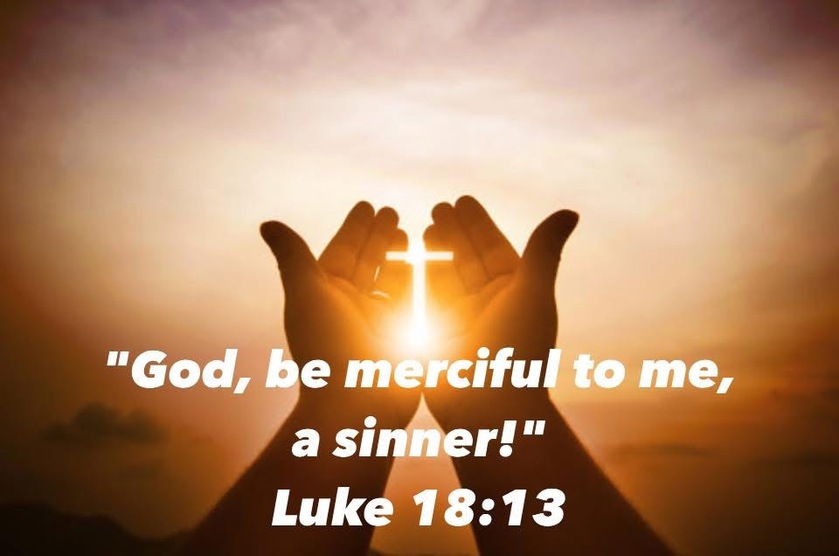Putting Two and Two Together: “A little yeast works through the whole batch of dough.”
Mark 8:15
And he cautioned them, saying, "Watch out; beware of the leaven of the Pharisees and the leaven of Herod."
Q: How is it that the disciples couldn't understand that Jesus' compassion wasn't limited to the people of Israel?
Q: Why do the Pharisees and the ruling authorities of Israel not understand the compassion of Jesus?
Q: How is it that the modern world cannot understand the compassion of Jesus Christ?
Jesus has divine power to provide for all their needs and more. And yet these people ALL think about his divine power in terms of the material things they want. Leaven, in the Bible, is always thought of as a symbol of evil. And that evil spirit is always passed down throughout the ages. And it only takes a tiny little bit of it to permeate the whole thing. That evil spirit infects the dough. It permeates everything and makes things heat up.
This leaven can help, or it can hurt. It's fickle that way. And it's fussy. It has to be done in just the right manner and managed properly to ensure proper handling of the material in order to produce the desired effect. And it's like this with signs and wonders, healings and miraculous feedings, and religious rituals and traditions. They all have a leaven-like spirit to them if the world sees these things as crucial to their faith and misinterprets them as the source of its power.
The Pharisees demand a sign, Jesus says no that this wicked generation want signs for false purposes. The disciples are told to beware the leaven of the Pharisees and they think Jesus is talking about the fact that they didn't bring bread with them in the boat. Jesus grills the disciples about their understanding concerning the miracles they've been helping him with. And apparently, they didn't know how to put two and two together.
In spite of their previous experience, the disciples continue in their spiritual blindness, the Holy Spirit has not yet fully revealed complete understanding about these things. They couldn't see that the previous feeding of the five thousand was for the Jews using Jewish baskets and serving Jewish people (see Mark 6:30-44). And now they still cannot fully understand that four thousand gentiles are the recipients of God's grace and compassion in this other instance. They miss the fact that there are seven baskets, seven gentile baskets. And on a more personal level they cannot fully see the bread of life that is standing right there in the boat with them.
They see stuff. Every day they see Jesus and witness to his works. They hear his words and serve his needs. They are the church, and they are literally doing church every day. And yet, they've not yet received the full blessing of the Holy Spirit that will instruct them in all the wisdom and knowledge of God's word. And that's not at all uncommon among the religious.
What's standing in the way?
Our free will stands in the way. By God's design we can make conscious decisions about our faith because that's how the Lord has determined things should be. And that free will can also be a limiting factor when leaven gets activated in the batch.
As if to make the point clearer, they come back to Bethsaida where they had miraculously fed the five thousand people. And they meet a blind man there. This isn't the first blind person healed here by Jesus. So, the townspeople know what to do. They bring this blind person to Jesus and ask that he touch him. They've seen how this is done; Jesus simply touches, and the person is healed. Sometimes they just touch Jesus and that's enough to get the blessing. So, they bring this man to Jesus and beg him to touch him.
Jesus takes the man outside the village, and he spits on his eyes and touches him. And he's not fully restored. He's got some new vision, but things aren't completely clear. He can make out people and he can understand that they are people, but what he sees is not completely true.
Mark 8:24
And he looked up and said [to Jesus], "I see people, but they look like trees, walking."
First off, the man must have had sight previously, probably not born completely blind. He could eventually recognize people as people, and trees as trees. So sometime in his life he was able to see, and then something happened to cause his blindness.
And now power, Holy Spirit power from Jesus is coming into him and causing a restoration to happen. But not completely and immediately. This healing takes more time and more power.
Mark 8:25
Then Jesus laid his hands on his eyes again; and he opened his eyes, his sight was restored, and he saw everything clearly.
What's the truth about these things?
If you asked people how to grow in godliness, they likely would give you a list of things they must do. Rituals they must perform. Prizes they must pursue and goals they must achieve. The Pharisees would have hundreds of pious solutions and sacraments that they must perform. The disciples would talk about things similar to the Pharisees because that leaven still remains in them to a certain degree. The gentiles had thousands, even millions of gods and goddesses they could reach out to in order to find their spiritual path.
What do you think the blind man from Bethsaida would have answered?
He probably at least in part understood that his justification and salvation was not something from within himself, he probably knew that now. He knew his sight wasn't restored by any human effort, except that it was Jesus the man who touched him and healed him. And so, it would be natural for him to look to Jesus for his justification and godly graces. He probably didn't understand fully what that meant. He maybe thought Jesus is the king of the Jews, the promised Messiah. But it's not likely that he fully grasps yet all the implications of that revelation.
What about the brotherhood of disciples? Did they fully grasp his divine power yet?
We'll dig into that tomorrow, as we continue in Mark chapter eight.
But as far as today goes, what's the takeaway here?
(For more information and better understanding read Galatians 5:9-15)
Jesus warns the brothers to watch out for the leaven of both the Pharisees and Herod. The Pharisees want signs for nefarious reasons to help bolster their religion and maintain religious authority. The Apostle Paul expounds upon that theme by pointing out the Christian Jews who were trying to add in the leaven of circumcision to the lifestyle of faith among the early church. Herod likewise looks for signs in the heavens, from the scriptures, and other ancient writings to protect his kingly authority. All this religious leaven is like a disease festering below the surface. It's never enough for them. They always need more power and influence to perpetuate their situations. So they develop traditions and create doctrines and laws that will ensure their success. A mandate for the masses that they can use to control the people. Together the state authority and the religious authority create these things to mutually benefit each other.
And in the same way the disciples are trapped in that same sort of thinking. They were still thinking in a "poverty mentality". They can't help but think there is never enough for their needs. There's always more they need to do. Jesus supplies all their needs over and over again, and yet they still think two dimensionally.
Jesus thought he had made it clear that faith is a lifestyle, not a doctrine. And truth be told, most Christians today still cannot think inside that "poverty mentality" box. They continue to look for the leaven of doctrine, and traditions to fulfill their faith needs. Most Christians, no matter the Christian sect, still lean on go to church every week, pray every day, read their Bibles, follow the proper feasts and fasts and do everything their clergy tells them to do. As they should in a perfect world. But this isn't a perfect world, and this isn't a perfect church. And the leaven is in the dough doing what it does.
All that Jesus asks is that we be aware of it and live a life of faith in his divine presence. A life that steps out of the leaven and takes chances based on His power, His love, and His promises. The life of faith that prays in the Spirit, not out of duty, but out of expectation that Jesus will fulfill his promises and give the revelation that we need when we need it. That he'll provide the means for our restoration, even if it takes a couple of touches. Faith that is assured, knowing that he'll provide for your family and home, your ministry and your community. A life of faith that expects God to act in unexpected ways. Ways that don't always conform to the leaven.




















